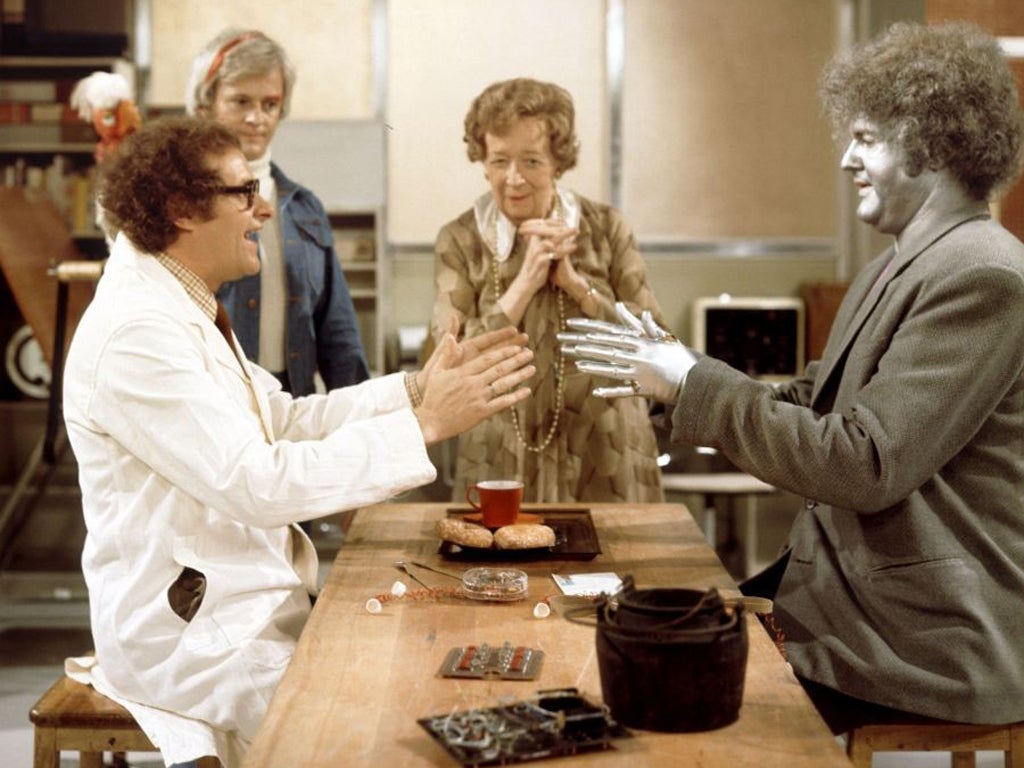John Clive: Actor who also wrote thrillers
Early years in Liverpool gave him the perfect voice for John Lennon in the animated ‘Yellow Submarine’ film

John Clive was blessed with a round and cheerful face, and very often the demeanour of a slightly nervy clown, so he got to jolly along many stage and screen productions, including farces and caper movies, in a happy career.
His perfect three-minute cameo in The Italian Job (1969), as a garage manager who has been babysitting Michael Caine's Aston Martin while the hero was in jail, was entirely improvised, the result of a friendship between Clive and Caine that had begun a decade earlier at the Buxton Club, a drinking den for hard-up actors, in the Haymarket, London. In the scene, Clive is handed a wad of suspiciously-tidily-bound bank notes as his fee, which Caine claims was his bounty for shooting tigers in India, Clive counts them, gleeful and mesmerised, almost cross-eyed. "You must have shot a lot of tigers" he murmurs. Politely, Caine replies, "Yes, I used machine guns" and speeds off.
Clive John Frederick Hambley was born in London in 1933 and spent his early childhood in Liverpool, before evacuation to North Wales during the war. He returned to Liverpool in 1947, and worked as a pageboy at the Shakespeare Theatre. While there, he auditioned for a children's show and found work as a boy singer, as well as assisting in comic sketches. He worked on his craft in repertory theatre, appearing in everything from Young Woodley to Lady Windermere's Fan, and secured his first film role (just a cough and a spit) in an Ealing comedy, The Magnet (1950).
Over the next 15 years he continued in rep and appeared as a comedian in summer shows with Ronnie Corbett and at Butlins, until Ken Loach cast him in one of television's early Wednesday Plays, Wear A Very Big Hat (1965), a warmly received but now forgotten drama about a pub altercation that triggers a personality crisis.
The play alerted television to Clive's talents as an eye-catching imp, and soon he was busy doing the business in The Saint, Man in a Suitcase and Z Cars (1967), starring alongside Terry Scott and Hugh Lloyd in The Gnomes of Dulwich (1969) and playing the lead in a children's comedy series, Robert's Robots (1973). His years in Liverpool proved useful when he provided the voice of John Lennon in the animated film Yellow Submarine (1968), although his contribution went uncredited as the producers preferred to suggest the Beatles had voiced their roles themselves.
The 1970s were his busiest period; on stage he was at home in NF Simpson's Playback 625 (1970) at the Royal Court, and as an "excellent and oddly memorable" Scarecrow in The Wizard of Oz at the Victoria Palace (1972). On screens he bounced from Kubrick's Clockwork Orange (1971) to The Dick Emery Show (1974-80) via smutty fare such as Tiffany Jones (1973), sitcoms Rising Damp (1974) and Rings on Their Fingers (1978) and period dramas, including Great Expectations (1974) and How Green Was My Valley (1975).
He gave a particularly smart performance in The Sweeney (1975) as a copper-hating journalist, and adorned two Carry Ons and two Pink Panther films. Of his role in the politico-comedy serial The Perils of Pendragon (1974), a critic remarked "John Clive playing the scheming heir apparent is emerging in this series as a character actor inventive enough to warrant his own programme." His performance in The Mating Game at the Academy Theatre in Johannesburg in 1971 prompted a critic to write that "his technique is masterly: the funniest farceur to walk the boards of this theatre in a long time."
Clive began to write thrillers, and this gradually overtook his acting career, although he still gave the occasional performance. He co-wrote his first novel, KG200 (1977), a Second World War spy story which became an international bestseller; and a stream of hits followed including The Last Liberator (1980) for which The Observer named him "the new master of intrigue, power and mystery". To research the semi-factual Broken Wings (1983) Clive moved to Ireland with his family while he conducted 150 interviews.
The novel, which was conceived as a screenplay, turned out to be another success of intelligent, thoughtful suspense. His last novel, The Lion's Cage (1988), was even more cinematic in its sweep and pace, and given his his acting background, one wonders what Clive might have achieved as a screenwriter. He claimed that all his books were based on real events that have "lain unexplored and not been investigated or analysed for one reason or another". A testament to this was his last, unpublished work, Expendable, a novel based around the death of weapons inspector Dr David Kelly.
But he will be best remembered for his refined goofiness on screen as a modest and charming supporting player who never quite got the chance to shine centre stage.
John Clive, actor and author: born London 6 January 1933; married 1968 Carole White (marriage dissolved; one son, one daughter), 2001 Bryony; died 14 October 2012.
Join our commenting forum
Join thought-provoking conversations, follow other Independent readers and see their replies
Comments
Bookmark popover
Removed from bookmarks